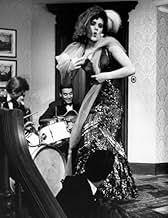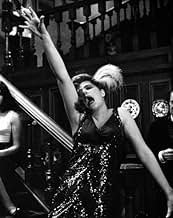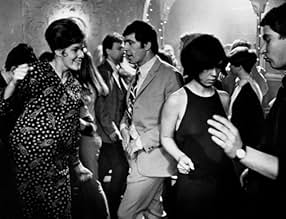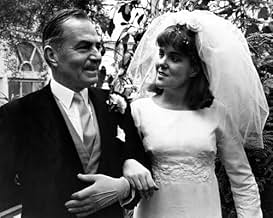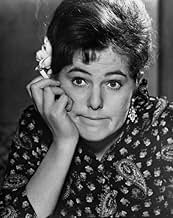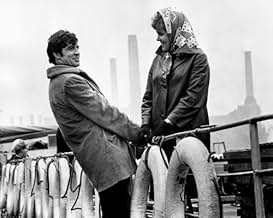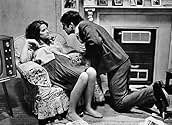IMDb-BEWERTUNG
6,9/10
4475
IHRE BEWERTUNG
Füge eine Handlung in deiner Sprache hinzuA young woman juggles an unwanted suitor's advances and her desire for an exciting life, envying her free-spirited roommate's social whirlwind.A young woman juggles an unwanted suitor's advances and her desire for an exciting life, envying her free-spirited roommate's social whirlwind.A young woman juggles an unwanted suitor's advances and her desire for an exciting life, envying her free-spirited roommate's social whirlwind.
- Für 4 Oscars nominiert
- 6 Gewinne & 17 Nominierungen insgesamt
Jolyon Booth
- Registry Office Clerk
- (as Jolyan Booth)
Lewis Alexander
- Party Guest
- (Nicht genannt)
Jack Arrow
- Party Guest
- (Nicht genannt)
Richard Atherton
- Waiter
- (Nicht genannt)
Roy Beck
- Party Guest
- (Nicht genannt)
Hyma Beckley
- Party Guest
- (Nicht genannt)
Empfohlene Bewertungen
Alan Bates' eccentric performance outshines in this interesting and whimsical film. It is certainly an odd mix of drama and comedy as Bates never seems to act seriously around what essentially is a perverse story with cutting moments, particularly Charlotte Rampling's performance in the hospital after her baby is born. Redgrave is perfect as the dowdy and shy Georgie - like her description in the book, she appears plain but strangely attractive. Mason again appears as the downtrodden anti-hero, never quite getting what he wants at the end of the film - in this respect he always seems typecast. There's always something I like about these B/W 1960's films with their gritty London location filming and this one is no exception.
I enjoyed "Georgy Girl" at the time of its original release, but hadn't thought about it until I recently viewed the DVD version. This revisit was well worth it: "Georgy Girl" is a delightful film.
Charlotte Rampling's Meredith is my favorite of the four main characters. Rampling has always been physically stunning, but it's her moody intellect within that keeps Meredith modern rather than a 60s icon who looks sensational in Mary Quant mini-dresses, a darker version of Julie Christie in "Darling" (a character who didn't have too much of a light side herself). Meredith is cool, in control, self-serving, brutal, and surprisingly honest about who she is. "You take me as me," she tells Jos (Alan Bates) as she cajoles him into marrying her, not so much because she's pregnant but because she's bored. It seems in Meredith's view, you can easily get rid of a pregnancy, but boredom requires more skill and is potentially a worse situation in which to find yourself. Other actresses could have successfully made Meredith a bitch, but Rampling makes her fascinating and thus strangely likable. When she exits the film, things go a bit limp, but then there's little left than to move the story to its inevitable conclusion.
Alan Bates plays Jos with such high physical and verbal energy he seems to be all the Marx Brothers rolled into one. His facial expression at the culmination of his strip during the 'I Love You' sequence suggested to me a nod to the great Harpo.
Lynn Redgrave made the role of Georgy so much her own it's difficult to believe the story that Vanessa Redgrave had been originally intended for it -- and even more difficult to imagine Vanessa playing scenes with Rampling.
The title song became a big hit at the time. In the film, the lyrics vary somewhat from the pop version, serving to set up the plot during the opening credits and then comment on its resolution at the end. In between, the song politely vanishes, leaving the classically influenced score by Alexander Faris to take over with its harpsichord riffs and its subtle playfulness. I especially liked the violin solo that accompanies the transition from orgasm to morning sickness.
The dialogue is often fast, overlapping, thrown away, or contains obscure (to me) cultural references, so it's worth enabling the English subtitles for DVD viewing. You wouldn't want to miss "Moss Bros", or Alan Bates' rapid-fire disrobing monologue, or Meredith's contempt for the concert at which she has just played violin: "Beethoven night. They're like animals."
Charlotte Rampling's Meredith is my favorite of the four main characters. Rampling has always been physically stunning, but it's her moody intellect within that keeps Meredith modern rather than a 60s icon who looks sensational in Mary Quant mini-dresses, a darker version of Julie Christie in "Darling" (a character who didn't have too much of a light side herself). Meredith is cool, in control, self-serving, brutal, and surprisingly honest about who she is. "You take me as me," she tells Jos (Alan Bates) as she cajoles him into marrying her, not so much because she's pregnant but because she's bored. It seems in Meredith's view, you can easily get rid of a pregnancy, but boredom requires more skill and is potentially a worse situation in which to find yourself. Other actresses could have successfully made Meredith a bitch, but Rampling makes her fascinating and thus strangely likable. When she exits the film, things go a bit limp, but then there's little left than to move the story to its inevitable conclusion.
Alan Bates plays Jos with such high physical and verbal energy he seems to be all the Marx Brothers rolled into one. His facial expression at the culmination of his strip during the 'I Love You' sequence suggested to me a nod to the great Harpo.
Lynn Redgrave made the role of Georgy so much her own it's difficult to believe the story that Vanessa Redgrave had been originally intended for it -- and even more difficult to imagine Vanessa playing scenes with Rampling.
The title song became a big hit at the time. In the film, the lyrics vary somewhat from the pop version, serving to set up the plot during the opening credits and then comment on its resolution at the end. In between, the song politely vanishes, leaving the classically influenced score by Alexander Faris to take over with its harpsichord riffs and its subtle playfulness. I especially liked the violin solo that accompanies the transition from orgasm to morning sickness.
The dialogue is often fast, overlapping, thrown away, or contains obscure (to me) cultural references, so it's worth enabling the English subtitles for DVD viewing. You wouldn't want to miss "Moss Bros", or Alan Bates' rapid-fire disrobing monologue, or Meredith's contempt for the concert at which she has just played violin: "Beethoven night. They're like animals."
... it's because it is. But you have to look at the year it was made - 1966. The top film at the box office that year was "The Bible", but the #3 movie was "Who's Afraid of Virginia Woolf?". So society and its values were definitely in transition, even in confusion.
The plot is centered on Georgy (Lynn Redgrave), a twenty-something working class British girl who is portrayed as overweight and plain when I think she is adorable. She's on a voyage of self-discovery, but ultimately finds that she's most fulfilled in service to others, in particular her roommate's infant child who is abandoned at birth, and whose care she enthusiastically takes up. This might have been a sweeter tale than it is if not for HOW Georgy manages to keep the child and support her, made especially puzzling by the closing rendition of the title song that infers that this is supposed to be a happy ending! To find out what she did you'll have to watch this yourself. This film was considered controversial for its time, dealing with promiscuity, abortion, hedonism, child abandonment, and classism.
This movie might have even had trouble being made in the US at the time, and it for sure had difficulty with some local TV station managers that considered it unsuitable even five years later. I know that in my hometown, Dallas, no TV station manager would air it as late as the early 70s. If you think that's odd, do realize that the local Dallas ABC affiliate wouldn't air NYPD Blue during its first season in the early 90s because station management considered it obscene!
If you do decide to watch it, remember it's definitely not a comedy though it has comic moments.
The plot is centered on Georgy (Lynn Redgrave), a twenty-something working class British girl who is portrayed as overweight and plain when I think she is adorable. She's on a voyage of self-discovery, but ultimately finds that she's most fulfilled in service to others, in particular her roommate's infant child who is abandoned at birth, and whose care she enthusiastically takes up. This might have been a sweeter tale than it is if not for HOW Georgy manages to keep the child and support her, made especially puzzling by the closing rendition of the title song that infers that this is supposed to be a happy ending! To find out what she did you'll have to watch this yourself. This film was considered controversial for its time, dealing with promiscuity, abortion, hedonism, child abandonment, and classism.
This movie might have even had trouble being made in the US at the time, and it for sure had difficulty with some local TV station managers that considered it unsuitable even five years later. I know that in my hometown, Dallas, no TV station manager would air it as late as the early 70s. If you think that's odd, do realize that the local Dallas ABC affiliate wouldn't air NYPD Blue during its first season in the early 90s because station management considered it obscene!
If you do decide to watch it, remember it's definitely not a comedy though it has comic moments.
I watched this movie mostly for Lynn Redgrave, expecting nothing more than an old, light-hearted British comedy. It was better than I expected; "Georgy Girl" is a lovely, bittersweet dramedy clearly inspired by American screwball comedies of the 30's and the French New Wave that was burning in the 60's (to see how much the Nouvelle Vague aesthetics influenced British cinema, check the also remarkable "Two for the Road", with Albert Finney and Audrey Hepburn).
Redgrave, fantastic as usual, plays Georgy, a scatter-brained working-class virgin with a golden heart. She shares a flat with a selfish, cold bitch (Charlotte Rampling), who gets pregnant of Jos (Alan Bates), and the three of them eventually move together; but things get complicated as Georgy is courted by Jos and James (James Mason), a much older man, at the same time.
Bates (is it just me, or does he look like Jean-Paul Belmondo - one of the greatest Nouvelle Vague icons because of Godard's "Breathless" - in this?), Rampling and Mason are all great in their respective parts, but this is Redgrave's show all the way. Her anti-heroine is sweet and memorable, somewhat similar to Toni Collette's Muriel Heslop (from "Muriel's Wedding"), some sort of a British, less patient and clumsier Amélie Poulain (Audrey Tautou). Georgy singing "Whole Lotta Woman" is a classic scene. Lynn's performance alone would make this movie worth seeing, but she's not the only good thing about it, just the core. 10/10.
Redgrave, fantastic as usual, plays Georgy, a scatter-brained working-class virgin with a golden heart. She shares a flat with a selfish, cold bitch (Charlotte Rampling), who gets pregnant of Jos (Alan Bates), and the three of them eventually move together; but things get complicated as Georgy is courted by Jos and James (James Mason), a much older man, at the same time.
Bates (is it just me, or does he look like Jean-Paul Belmondo - one of the greatest Nouvelle Vague icons because of Godard's "Breathless" - in this?), Rampling and Mason are all great in their respective parts, but this is Redgrave's show all the way. Her anti-heroine is sweet and memorable, somewhat similar to Toni Collette's Muriel Heslop (from "Muriel's Wedding"), some sort of a British, less patient and clumsier Amélie Poulain (Audrey Tautou). Georgy singing "Whole Lotta Woman" is a classic scene. Lynn's performance alone would make this movie worth seeing, but she's not the only good thing about it, just the core. 10/10.
Overall, I recommend this flick. I particularly liked the character of Georgy ...the way she tries to cover up any vulnerability with wit/ spunk..she MAKES the movie. But I can't help be bummed at the ending. Rationally, I approve of the ending, but find it disappointing at the same time..... It was more sensible,plausible and had more integrity than if they'd kept Georgy & Jos together...but...but... James Mason creeped me out through the whole movie (I mean, he watched her grow up..the old lecher!) and Alan Bates was soo ADORABLE (yes, he was selfish & immature too, I KNOW. He had potential for change??Maybe??) I supposed I'm just biased, Alan Bates (Alan Bates of the late '60s & '70s that is)being up there on my list of unconventional crushes.
Wusstest du schon
- WissenswertesVanessa Redgrave backed out of the role of Georgy just before shooting started. Her sister Lynn picked up the part instead.
- PatzerIn the early scene at the piano where Georgy's father has brought her a dress to wear to a birthday party, she's wearing glasses when he starts to say, "Oh, please yourself," but not wearing them before he finishes the line.
- VerbindungenFeatured in The Lady with the Torch (1999)
Top-Auswahl
Melde dich zum Bewerten an und greife auf die Watchlist für personalisierte Empfehlungen zu.
Details
- Erscheinungsdatum
- Herkunftsland
- Sprachen
- Auch bekannt als
- Georgy - En ploygirl
- Drehorte
- Dame Clara Butt House, 7 Harley Road, London, Greater London, England, Vereinigtes Königreich(James Leamington's mansion)
- Produktionsfirma
- Weitere beteiligte Unternehmen bei IMDbPro anzeigen
Box Office
- Budget
- 400.000 $ (geschätzt)
- Laufzeit
- 1 Std. 39 Min.(99 min)
- Farbe
Zu dieser Seite beitragen
Bearbeitung vorschlagen oder fehlenden Inhalt hinzufügen


